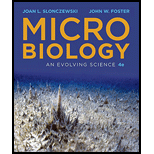
Microbiology: An Evolving Science (Fourth Edition)
4th Edition
ISBN: 9780393615098
Author: John W. Foster, Joan L. Slonczewski
Publisher: W. W. Norton & Company
expand_more
expand_more
format_list_bulleted
Concept explainers
Question
Chapter 20.2, Problem 3TQ
Summary Introduction
To review:
The advantages and limitations of motile gametes as compared to non-motile gametes.
Introduction:
Gametes are mature haploid male or female cells that unite with the gamete of the opposite sex in order to form a zygote. They can be of two different types motile and non-motile. The gametes that are identical in form are called isogametes and are found in the species of algae,
Expert Solution & Answer
Want to see the full answer?
Check out a sample textbook solution
Students have asked these similar questions
Why do diploid organisms that reproduce via sexual reproduction even bother with meiosis? What is the point of this complex and energetically expensive process?
Why is meiosis important in sexually reproducingorganisms?
What is the difference between a follicular cyst and a corpus luteum cyst?
Chapter 20 Solutions
Microbiology: An Evolving Science (Fourth Edition)
Knowledge Booster
Learn more about
Need a deep-dive on the concept behind this application? Look no further. Learn more about this topic, biology and related others by exploring similar questions and additional content below.Similar questions
- What is unusual about the cytoplasm during cell divisions that result in spermatids?arrow_forwardWhat are the advantages and disadvantages of the alternation between fertilization and meiosis in sexually reproducing organism?arrow_forwardWhat type of gamete is produced by an antheridial head? By an archegonial head? Are these produced by the process of mitosis or meiosis?arrow_forward
- Please provide an illustration of the stages of meiosis of Ascaris lumbricoides: Anaphase I, Telophase I, Prophase I, Metaphase II, Anaphase II, and Telophase IIarrow_forwardPlasmogamy is the fusion of(a) two haploid cells including their nuclei.(b) two haploid cells without nuclear fusion.(c) sperm and egg.(d) sperm and two polar nuclei. Please try to break the solutions into as many steps as practically possible and the steps should come one by one and they should be short and crisp and plagiarism-free.arrow_forwardHow does the role of meiosis in gamete production differ between organisms with a diploid-dominant life cycle and organisms with an alternation of generations life cycle?arrow_forward
- Which statement does not accurately describe what occurs during the process of meiosis? A) All stages of meiosis follow DNA replication. B) Meiosis produces gametes with the haploid chromosome number. C) Meiosis produces four identical gametes, either egg or sperm. D) Genetic variation among sexually reproducing organisms is enhanced by meiosis. Not Gradedarrow_forwardIf a variety of seaweed reproduces only through mitosis, this would be considered is "asexual reproduction" true or false?arrow_forwardWhat is the difference between a diploid cell and a haploid cell, and which of these cell types is destined to become a gamete?arrow_forward
- Why is meiosis important for the maintenance of the normal quantity of chromosomes of a species with sexual reproduction?arrow_forwardis mature spirogyra haploid or diploid? what type of sexual life cycle is being exhibited by this organism?arrow_forwardOne of the advantages of sexual reproduction is that it promotes genetic diversity in the offspring. This is because gametes are produced by meiosis, which introduces genetic variation into the resulting gametes. How does meiosis accomplish this? Describe one way (there are several choices) in which meiosis produces new combinations of genes in gametes.arrow_forward
arrow_back_ios
SEE MORE QUESTIONS
arrow_forward_ios
Recommended textbooks for you
 Human Biology (MindTap Course List)BiologyISBN:9781305112100Author:Cecie Starr, Beverly McMillanPublisher:Cengage Learning
Human Biology (MindTap Course List)BiologyISBN:9781305112100Author:Cecie Starr, Beverly McMillanPublisher:Cengage Learning

Human Biology (MindTap Course List)
Biology
ISBN:9781305112100
Author:Cecie Starr, Beverly McMillan
Publisher:Cengage Learning
General Embryology Review in 20 minutes; Author: Medical Animations;https://www.youtube.com/watch?v=4YKvVeVMmEE;License: Standard youtube license